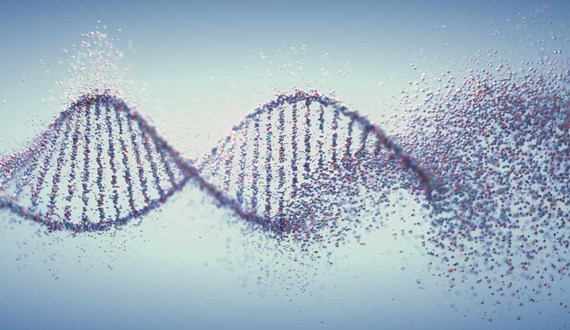
Gastrointestinal Oncology Research Studies Presented at ASCO 2022
Moffitt's Gastrointestinal Oncology Program presented exciting new research findings at ASCO 2022.
Dr. Ibrahim Sahin Gives Update on GI Cancers at ASCO 2022
Dr. Ibrahim Sahin presented an exciting overview of novel approaches in the treatment of colorectal cancer. Progress in precision medicine has presented positive results in the management of colorectal tumors. Additionally, studies were taken combining BRAF-target therapy with immunotherapy which presented highly promising results. A number of clinical trials are in progress for "actionable genes," implicating alternations in the DNA or in the genomic structure of the cancer cells.
Additionally, the investigation of immunotherapy in colorectal cancer is also presenting significant research findings. By targeting certain pathways, the objective is to shut these pathways down, inactivating t-cells and then adding the immunotherapy. The objective is to create synergistic pathways to make colorectal cancer cells more immune responsive.
Survival rates in pancreatic cancer remain low despite advancements in treatment methods. Historically, stereotactic body radiotherapy (SBRT; high dose per fraction radiation) may exhibit improved clinical outcomes in locally advanced pancreatic cancer but carries potential gastrointestinal toxicity risks. Rucosopasem is one of a class of investigational selective dismutase mimetics that rapidly and specifically converts superoxide to hydrogen peroxide. Studies have shown that normal cells tolerate hydrogen peroxide fluxes better than cancer cells. Additionally, dismutase mimetics have the potential to increase tumor control of SBRT without compromising radiation safety.
Dr. Sarah Hoffe, section head of GI’s Radiation Oncology Program at Moffitt, presented a pilot phase ½ trial in patients with pancreatic cancer. The objective of this study is to determine the effect of adding Rucosopasem to SBRT to increase the overall survival rate in patients with borderline resectable or locally advanced, unresectable non-metastatic pancreatic cancer following initial chemotherapy with a FOLFIRINOX-based regimen or a gemcitabine doublet. Approximately 160 patients will be randomized (approximately 35 sites) to receive Rucosopasem 100mg or placebo via IV infusion over 15 minutes, prior to each SBRT fraction (5 x 10 Gy). Patients considered to be resectable will undergo surgical exploration within 8 weeks after SBRT. The primary outcome is overall survival. The secondary outcome results in progression-free survival, locoregional control, time to metastasis, surgical resection rate, RO resection rate, best overall response, in-field local response, and safety (acute and late toxicities). Exploratory endpoints include PRO-CTCAE and CA19-9 normalization.
The outcomes determined Avasopasem, a dismutase mimetic related to Rucosopasem, nearly doubled median overall survival in patients receiving SBRT vs. placebo plus SBRT. Improvements versus placebo were also observed in local tumor control, time to metastases, and progression-free survival. Altogether, the data support the hypothesis that Rucosopasem may improve survival and the benefit-risk ratio of SBRT by improving efficacy without increasing gastrointestinal toxicity. This clinical trial is currently enrolling.
Although incidences of newly diagnosed early-onset mCRC has shown increases in the recent years, disparity of treatment-related adverse events (AE) and patient outcomes has been inadequately studied with inconclusive findings. Dr. Meng presented research findings evaluating such age-related disparity and explore potential underlying causes.
This study examined three clinical trials -756 and 467 cohorts with mCRC received first-line FOLFOX in study 1 (NCT 00305188, NCT00272051) and study 2 (NCT00364013). Clinical NGS data of 763 patients with mCRC from prospectively maintained Moffitt Clinical Genomics Database were used to assess genomic alterations. Clinical NGS data of 763 patients with mCRC from prospectively maintained Moffitt Clinical Genomics Database were used to assess genomic alterations. Patients were categorized into 3 age groups: <50, 50-65, and >65 years. Continuous and categorical variables were compared with t test and χ2 test, and Kaplan-Meier method and log-rank test were used for survival analysis. Benjamini-Hochberg procedure was used to adjust for multiple comparisons.
Of 1986 patients, 341 <50 age group (17.2%), 915 in the 50-65 age group (45.9%), and 733 >65 age group (36.9%) presented similar baseline characteristics. The outcome concluded patients in the <50 group had shorter median OS compared to the 50-65 (15.5 vs 20.5 month, p=0.003) and >65 groups (15.5 vs 20.8 months, p=0.004) and shorter median PFS compared to the 50-65 (8.1 vs 9.4 month, p=0.039) and >65 groups (8.1 vs 8.6 months, p=0.07) in study 1. Findings were confirmed in study 2. Toxicity showings compared to other age groups, the <50 group had a higher incidence of severe (grade≥3) abdominal pain (8.4% vs 3.4%, p=0.01), severe anemia (6.1% vs 1.2%, p=0.001), nausea/vomiting (69.3% vs 58.8%, p=0.02), but lower incidence of severe diarrhea (6.1% vs 10.8%, p=0.02), severe neutropenia (25.7% vs 44.2%, p<0.001), and severe fatigue (4.5% vs 7.3%, p=0.02). The <50 group had earlier onset of nausea/vomiting (1.0 vs 2.3 weeks, p=0.01), mucositis (3.6 vs 5.4 weeks, p=0.05), and neutropenia (8.0 vs 9.0 weeks, p=0.04), and shorter duration of mucositis (0.6 vs 0.9 weeks, p=0.006). Outcomes + toxicity: In the <50 group, abdominal pain was associated with worse OS (HR 1.6, p=0.01). In contrast, fatigue (HR 0.66, p=0.03) and mucositis (HR 0.67, p=0.046) were associated with better OS. Neuropathy was associated with better PFS (HR 0.61, p=0.009). Genomics: Our NGS data showed that the <50 group had more ERBB2 amplification (10.5% vs 4.0%, p=0.04) and a trend of more TP53 mutations (80.2% vs 72.0%, p=0.07).
In summary, patients with early-onset mCRC had worse outcome and unique treatment-related adverse effect patterns. Distinct genomic profiles could explain some of the disparities. Our findings may improve a personalized management approach in patient edibility in chemotherapy, counseling and AE monitoring.
If you’d like to refer a patient to Moffitt, complete our online form or contact a physician liaison for assistance. As part of our efforts to shorten referral times as much as possible, online referrals are typically responded to within 24 - 48 hours.
